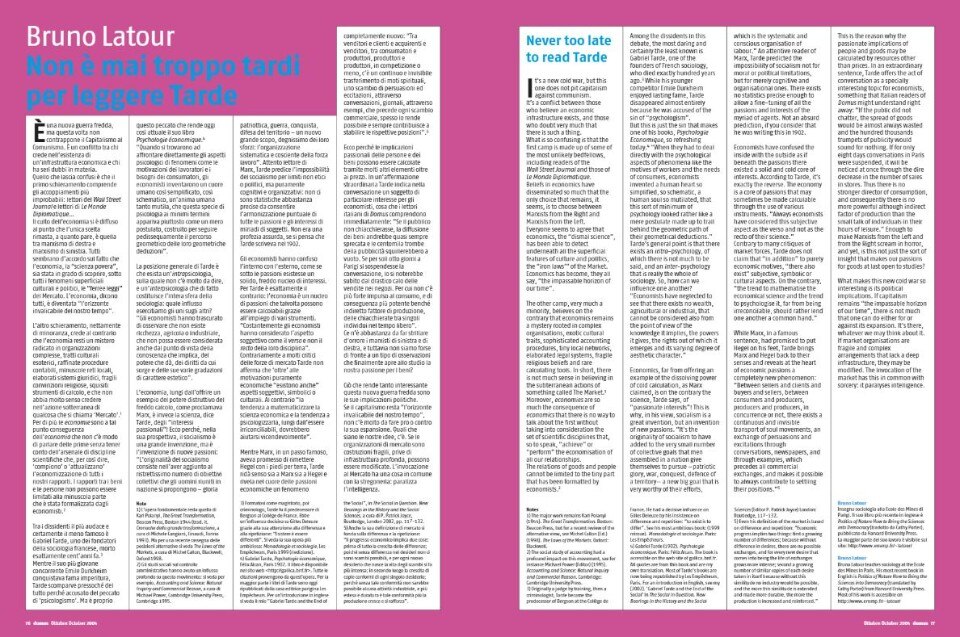It’s a new cold war, but this one does not pit capitalism against communism. It’s a conflict between those who believe an economic infrastructure exists, and those who doubt very much that there is such a thing. What is so confusing is that the first camp is made up of some of the most unlikely bedfellows, including readers of the Wall Street Journal and those of Le Monde Diplomatique. Beliefs in economics have disseminated so much that the only choice that remains, it seems, is to choose between Marxists from the Right and Marxists from the Left. Everyone seems to agree that economics, the “dismal science”, has been able to detect underneath all the superficial features of culture and politics, the “iron laws” of the Market. Economics has become, they all say, “the impassable horizon of our time”.
The other camp, very much a minority, believes on the contrary that economics remains a mystery rooted in complex organisations, exotic cultural traits, sophisticated accounting procedures, tiny local networks, elaborated legal systems, fragile religious beliefs and rare calculating tools. In short, there is not much sense in believing in the subterranean actions of something called The Market. Moreover, economies are so much the consequence of economics that there is no way to talk about the first without taking into consideration the set of scientific disciplines that, so to speak, “achieve” or “perform” the economisation of all our relationships. The relations of goods and people cannot be limited to the tiny part that has been formatted by economists.
Among the dissidents in this debate, the most daring and certainly the least known is Gabriel Tarde, one of the founders of French sociology, who died exactly hundred years ago. While his younger competitor Emile Durkheim enjoyed lasting fame, Tarde disappeared almost entirely because he was accused of the sin of “psychologism”. But this is just the sin that makes one of his books, Psychologie Economique, so refreshing today. “When they had to deal directly with the psychological aspects of phenomena like the motives of workers and the needs of consumers, economists invented a human heart so simplified, so schematic, a human soul so mutilated, that this sort of minimum of psychology looked rather like a mere postulate made up to trail behind the geometric path of their geometrical deductions.”

Tarde’s general point is that there exists an intra-psychology, of which there is not much to be said, and an inter-psychology that is really the whole of sociology. So, how can we influence one another? “Economists have neglected to see that there exists no wealth, agricultural or industrial, that cannot be considered also from the point of view of the knowledge it implies, the powers it gives, the rights out of which it emerges and its varying degree of aesthetic character.”
Economics, far from offering an example of the dissolving power of cold calculation, as Marx claimed, is on the contrary the science, Tarde says, of “passionate interests”! This is why, in his view, socialism is a great invention, but an invention of new passions. “It’s the originality of socialism to have added to the very small number of collective goals that men assembled in a nation give themselves to pursue — patriotic glory, war, conquest, defence of a territory — a new big goal that is very worthy of their efforts, which is the systematic and conscious organisation of labour.” An attentive reader of Marx, Tarde predicted the impossibility of socialism not for moral or political limitations, but for merely cognitive and organisational ones. There exists no statistics precise enough to allow a fine-tuning of all the passions and interests of the myriad of agents. Not an absurd prediction, if you consider that he was writing this in 1902.
Economists have confused the inside with the outside as if beneath the passions there existed a solid and cold core of interests. According to Tarde, it’s exactly the reverse. The economy is a core of passions that may sometimes be made calculable through the use of various instruments. “Always economists have considered this subjective aspect as the verso and not as the recto of their science.” Contrary to many critiques of market forces, Tarde does not claim that “in addition” to purely economic motives, “there also exist” subjective, symbolic or cultural aspects. On the contrary, “the trend to mathematise the economical science and the trend to psychologise it, far from being irreconcilable, should rather lend one another a common hand.”

While Marx, in a famous sentence, had promised to put Hegel on his feet, Tarde brings Marx and Hegel back to their senses and reveals at the heart of economic passions a completely new phenomenon: “Between sellers and clients and buyers and sellers, between consumers and producers, producers and producers, in concurrence or not, there exists a continuous and invisible transport of soul movements, an exchange of persuasions and excitations through conversations, newspapers, and through examples, which precedes all commercial exchanges, and makes it possible to always contribute to settling their positions.”
This is the reason why the passionate implications of people and goods may be calculated by resources other than prices. In an extraordinary sentence, Tarde offers the act of conversation as a specially interesting topic for economists, something that Italian readers of Domus might understand right away: “If the public did not chatter, the spread of goods would be almost always wasted and the hundred thousands trumpets of publicity would sound for nothing. If for only eight days conversations in Paris were suspended, it will be noticed at once through the dire decrease in the number of sales in stores. Thus there is no stronger director of consumption, and consequently there is no more powerful although indirect factor of production than the small talk of individuals in their hours of leisure.” Enough to make Marxists from the Left and from the Right scream in horror, and yet, is this not just the sort of insight that makes our passions for goods at last open to studies?
What makes this new cold war so interesting is its political implications. If capitalism remains “the impassable horizon of our time”, there is not much that one can do either for or against its expansion. It’s there, whatever we may think about it. If market organisations are fragile and complex arrangements that lack a deep infrastructure, they may be modified. The invocation of the market has this in common with sorcery: it paralyses intelligence.


